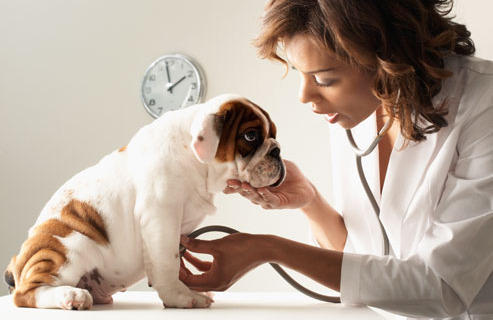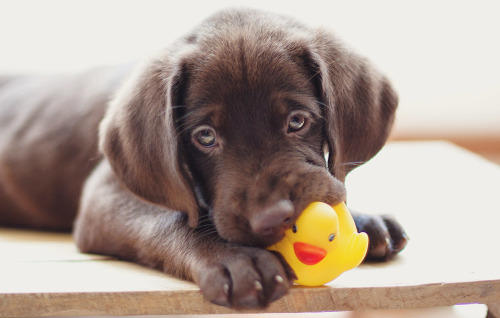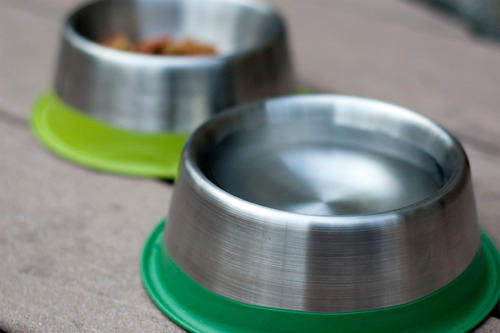Prepare for Chaos and Unconditional Love
It may seem like a very simple concept; how difficult can it be to take care of a puppy? The truth is, there are a number of things you will need to do and purchase when welcoming a new addition to the family. Once all the little things are in place, taking care of a pup is fairly straightforward. One thing is for sure, puppies can tire you out and raise your blood pressure when you find a broken vase or chewed up shoe. All that doesn't really matter when that little furry ball loves you unconditionally. A few important things to consider when you receive your new little pup.
Medical Care

First, choose a reliable and trustworthy veterinarian if you don't already have one. On your first trip to the vet (your puppy should be between six and nine weeks old), enquire about deworming medication. The deworming process is important because many worms and parasites can easily be passed on to humans, creating health problems for your family. The second trip to the vet should be organised when your puppy is anywhere between 12 and 16 weeks. This visit is usually for a rabies vaccination. Ask your vet for any other recommended vaccinations or tests they think should be conducted.
Normally, veterinarians will recommend that you get your pup spayed or neutered after all their vaccines. However, this may differ under certain circumstances, so check with your vet for the correct time frame. Tip! It is important to spay your female pup before they reach their first heat cycle; the reason for this is to reduce any risk your dog may have of developing mammary tumours or ovarian cancer.
Puppy-Proof Your House
When bringing a little puppy home, you will need to puppy-proof your house, especially in the beginning. This is not only to keep your puppy safe from harmful items, but also to keep the items in your home safe and in good condition. Purchase an exercise pen for your puppy while it is still small and in training. Alternatively, you could keep it in a particular room or area. Remove any items that could be chewed, eaten or drunk. Keep expensive and breakable ornaments away from your puppy area.
What You Need to Buy
Puppy bed: Make sure each pet you have gets their own bed (to avoid fighting). Ensure your puppy's bed is soft and comfortable. It should be kept clean at all times.
Toys: Try to purchase a variety of toys to include both soft toys for playing with as well as chewing toys. With this said, ensure the toys you choose are not possible choking hazards.
Bowls: You will need to purchase two bowls, one for food and the other for water. Stainless steel bowls are ideal as they stay clean and don't break or chip around the edges.
Treats: Small soft treats are ideal for training. Use these to indicate to your puppy that it has done something good. Hard, crunchy treats are also good to have and are good for cleaning puppy's teeth.
Grooming: It's not only about the looks! At least two grooming items are essentials, a hair brush and shampoo.

Your Pup's Diet
When you receive your new puppy, make sure you ask the shelter or the breeder about the food they have been feeding the puppythus far. If you wish to continue providing the same food, you can do so. However, if you wish to change it, do this after a few weeks so that the pup can adjust first.Try to change over to the new food gradually, as rapid change cause diarrhoea or vomiting.
Make sure you know how much food your pet needs, as each puppy's nutritional requirements depend on its size and breed. You can enquire with your vet about the correct diet. Also note your puppy's size, as this could be a good indication of the amount of food they should eat. The number of times you feed your puppy will depend on its age. Here is a feeding guideline:
8 to 12 weeks old: feed three to four times a day
12 to 20 weeks old: feed three times a day
20 weeks and older: feed two times a day
There are certain foods your dog should not be eating, no matter what age or size it is. Very simply put, certain human food can be harmful to dogs. We have created a breakdown of the foods your puppy should not be eating.
Harmful Food

Alcohol has the same harmful effect on dogs as it does on humans, but the harmful effects are much worse for dogs, especially smaller dogs. It only takes a little bit to cause a lot of harm: coordination problems, breathing problems, diarrhoea and vomiting.
A large amount of avocado is poisonous for dogs due to a substance in them called persin.
Onions and garlic in any form or shape are dangerous for your dog, whether ingested a lot once or regularly in small amounts. This is because onion and garlic kills dog's red blood cells and can form anemia.
Caffeine in any form is bad, be it in tea, coffee or even energy drinks. Symptoms include muscle twitches and restlessness.
Milk and dairy can cause digestive problems for your pup. You might also notice allergies and itchiness.
Raisins and grapes can cause kidney failure in dogs. Symptoms include depression and vomiting.
Chocolate is a big no-no. All types of chocolate are dangerous, but dark chocolate is the most dangerous. Seizures, tremors, diarrhoea and vomiting are some signs to look out for.
Raw meat, fish or eggs. If you are feeding your dog any one of these items, stop. Raw foods can have bacteria that cause poisoning.
Salt is a very sly but dangerous one, as it is with humans. Huge amounts of salt will make your puppy extremely thirsty. Symptoms of excessive amounts of salt include tremors, high temperatures, vomiting and diarrhoea. In extreme cases, even death may occur.
Xylitol and sugary items are very bad treats for your dog. Too much sugar in your dog's body can cause liver failure and make their blood sugar levels drop. Symptoms can start with coordination problems and vomiting, eventually leading to possible seizures.
So there you have it, a few tips just so that you are informed and more aware of important things to consider when adding a new furry member to your family. When it comes to taking care of them, dogs and animals in general are very easy to please, they just want to be loved and fed.